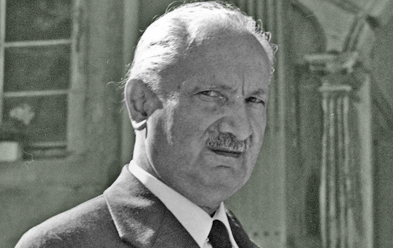
While a freshman at Marburg University, Hannah Arendt attended one of Martin Heidegger’s philosophy lectures in November 1924. The resulting affair is among the most famous in intellectual history. It also served to pique Arendt’s interest in the subjectivity of Pauline Christianity and a secular philosophy; as Heidegger said, “freedom—and not a changeless Godhead—is the reason for reasons.” Both thought the relationship ended definitively when Heidegger took leadership of the Nazi Rectorate and Arendt went into exile in France. They met years later in Freiburg, in what was anticipated on either side to be a difficult meeting. It proved to be a conciliatory one.
Freiburg, March 19, 1950
Bach, Brandenburg Concerto no. 3
2nd movement, allegro
Hannah,
The gift of return and the taking stock of twenty-five years keep intruding on my thoughts, in which, far across the sea, you are near and present, thinking yourself here toward those dearest to you and toward all the things that belong with you.
In recent days every passing hour carried you farther away to the city and, across the distance, brought what is most yours still closer. For you will not avert your gaze; you will awaken intimacy from afar.
Time is oddly mysterious: how it can return like this and transform everything. Everything is given to us anew. We will never come to the end of it: with gratitude for what has become of us.
I knew this when I stood before you again on February 6 and said “Du.” I knew that now a new period of growth was beginning for us, but I also knew that love is required to plant everything in open trust.
When I tell you that my love for my wife has only now become clear and vital again, I have her fidelity to thank for it, along with her trust in us, and your love.
When I spoke of “beauty,” I was thinking of Rilke’s notion that the beautiful is nothing but the beginning of the terrible, and of Hölderlin’s idea that the beautiful can unite extreme opposites in intimacy. Who may reach into the depths of beauty, who but lovers?
Hannah, stay as close to Elfride as you were able to be here. The more beautifully what is ours becomes ours, all the more wholly will it belong to her and to me. I need her love, which bore everything in silence through the years and still has room to grow. I need your love, which, mysteriously maintained in its early seeds, brings hers from its depths. In the same way, I also want to nurture in my heart a silent friendship with your husband, who became your companion in those years of suffering.
What is particularly unique about each person’s essence, what preserves his uniqueness, is also uniquely strong in the recognition of the unique other.
We are, I think, still unfamiliar with the quiet laws of uniqueness, and with the fortitude required to remain true to them. But perhaps just this is our task: to ponder these laws and shape them in love. Love needs love: that is the most essential of all demands.
For many days now, I have been busy making a fair copy of “Insight.” As I wrote, our conversations on the paths to the forest valley and to the castle came back to me. How beautiful this exciting, still almost unspoken understanding is, emerging from an affinity that was created so quickly, that comes from so far away, that has not been shaken by evil and confusion. May we never again relinquish this familiarity between us—may it help us both in our need, our distress, our defenselessness.
Hannah, when the city tears at you furiously, think of the straight firs towering up before us, into the light air of midday in the winter mountains.
Thank you for your last letter from Europe, for the one from Basel, and for the glorious Braque portfolio from Paris. The marguerites, the sunflowers, and the Blue Jug are the most beautiful of the prints—but everywhere the colors are magnificently luminous.
This is a first, clumsy greeting across the sea from me to your heart, Hannah, a greeting to your steadfast heart and the gaze you turn toward here.
Martin.
Say hello to your dear husband and to your friend.
Elfride sends you her very best.
From Letters, 1925-1975/ Hannah Arendt and Martin Heidegger. Edited by Ursula Ludz. Translated by Andrew Shields. Orlando: Harcourt, Inc., 2004. p. 70.
FURTHER READING
Recent incriminations.
What Arendt called “star crossed.”
Von Trotta’s docudrama, replete with a forested meeting between the ex-lovers.
The concerto which Heidegger was apparently listening to while writing the above letter.


